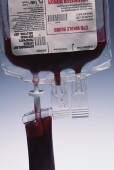Restrictive threshold not superior to liberal threshold for morbidity, health care costs
WEDNESDAY, March 11, 2015 (HealthDay News) — For patients undergoing nonemergency cardiac surgery, a postoperative restrictive transfusion threshold is not superior to a liberal threshold, according to a study published in the March 12 issue of the New England Journal of Medicine.
Gavin J. Murphy, M.B., Ch.B., M.D., from the University of Leicester in the United Kingdom, and colleagues conducted a multicenter parallel-group trial involving patients older than 16 years who were undergoing nonemergency cardiac surgery. Patients with a postoperative hemoglobin level of less than 9 g/dL were randomized to a restrictive transfusion threshold (hemoglobin level <7.5 g/dL; 1,000 patients) or a liberal transfusion threshold (<9 g/dL; 1,003 patients).
The researchers found that the transfusion rates after randomization were 53.4 percent in the restrictive-threshold group and 92.2 percent in the liberal-threshold group. The primary outcome of serious infection or an ischemic event within three months after randomization occurred in 35.1 and 33.0 percent of patients in the restrictive- and liberal-threshold groups, respectively (odds ratio, 1.11; 95 percent confidence interval, 0.91 to 1.34; P = 0.30). The restrictive-threshold group had more deaths than the liberal-threshold group (4.2 versus 2.6 percent; hazard ratio, 1.64; P = 0.045). There was no significant between-group difference in costs.
“A restrictive transfusion threshold after cardiac surgery was not superior to a liberal threshold with respect to morbidity or health care costs,” the authors write.
Full Text (subscription or payment may be required)
Editorial (subscription or payment may be required)
Copyright © 2015 HealthDay. All rights reserved.








